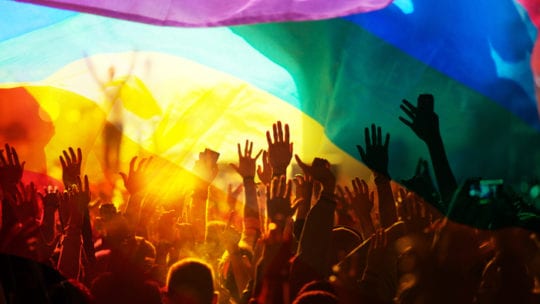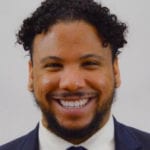
Between a global pandemic, #BLM’s resurgence and the recent Supreme Court ruling redefining the word sex in the workplace, we’ve seen a lot of history in a short period of time.
The progress this past month alone offers hope for the future. But what if that future started today? The Museum of Public Relations will hold its annual “LGBTQ Experience in Public Relations” event Tuesday, June 30. It will serve as a platform for PR's LGBTQ leaders to discuss and reflect on the community’s presence at work and in society. Register for the free, virtual event here.
In the first of a two-part series, panelists scheduled to speak during that event share experiences and visions for a more inclusive future.
 Del Galloway, VP, Communication, Wells Fargo
Del Galloway, VP, Communication, Wells Fargo
PR has the power to shape ideas, forge opinion and advance civil society. Storytelling is key to our role. Stories are entertainment, education, and expressions of values. The stories of Stonewall–and the LGBTQ+ movement writ large–are vitally important in the canon of American civil and equal rights.
The Supreme Court ruling–protecting LGBTQ+ people from workplace discrimination based on sexual orientation and gender identity–is a major milestone in the advancement of our rights and an important chapter in the story of our movement.
The power of PR can help right societal wrongs. The global pandemic and senseless murder of George Floyd further reveal racial inequities and social injustice. In that space, in this moment, we can help drive change.
That we'll gather June 30 to discuss evolution of the gay rights movement and first Pride parade–some 50 years ago–is a big deal. My career began in the early 80s, when the idea of diversity and inclusion–much less gay rights–was foreign. I hope we can strengthen our understanding of PR's power to advance our movement, and in so doing remember the sacrifices of past activists. We stand on their shoulders. Building on their efforts we move closer to America’s promise of a more perfect union.
 Camille DeSantis, Associate EVP, Group Head, Corporate & Biotech, Edelman
Camille DeSantis, Associate EVP, Group Head, Corporate & Biotech, Edelman
Audre Lorde said, “There is no such thing as a single-issue struggle because we do not live single-issue lives.” June 2020 offers proof: Black Lives Matter protests; the erasing of protections for transgender people; the COVID-19 pandemic, which fueled anti-Asian racism; and LGBTQ Pride Month.
Many people are living multiple-issue lives. We are leaving part of our communities behind if we do not recognize this. One way to address this is to include intersectionality in diversity and inclusion (D&I) programming.
Recognizing that this is reality is the first step toward an intersectional approach to D&I. Lifting up voices and helping tell their stories keep them present in the discourse. Cultivating a sense of belonging, where everyone feels accepted and valued, is another important step. Acknowledging and appreciating the experiences we all bring to the workplace and the community is essential to achieving inclusivity.
 Kaz Mitchell-Wimberly, Executive Director, Circle of Voices
Kaz Mitchell-Wimberly, Executive Director, Circle of Voices
We are glad to hear that the Supreme Court has added protections to our employment opportunities, but as Black & Brown people know, it is a start in the right direction only. People of color have been left out of so many circles. For this reason and more, it is important for PR to be more inclusive and diverse with its messaging. Our goal during the event next week should be to depart with a sense of change and togetherness.
 Troy Blackwell, Jr., National Director, Press Advance; Obama White House alum; board member, BPRS-NY & PRSA Tri State
Troy Blackwell, Jr., National Director, Press Advance; Obama White House alum; board member, BPRS-NY & PRSA Tri State
As we usher in a new day, I encourage PR practitioners and agencies to be LGBTQ-inclusive in their communication. Adopt the use of gender pronouns in email signatures and use gender-neutral language when referring to titles. LGBTQ PR pros can promote LGBTQ employee resource groups to help create safe spaces and foster community.
Coming up as a communicator on Capitol Hill and in various campaigns, I’ve met other LGBTQ PR pros who worry that being out will influence their career chances. There is a generation coming up in the industry where this is the first time they are seeing openly gay people in the C-suite.
 James LaForce, President, LaForce
James LaForce, President, LaForce
LGBTQ leaders in PR, marketing and communications have an extraordinary influence on how companies treat employees and brands define and serve customers. We can help change behavior. Our voices are heard.
It’s been hard-won, but we finally have a seat at the table. At this crucial point, when a confluence of the pandemic and Black Lives Matter have sparked a global rethink of human rights, inequality and institutional racism, LGBTQ communicators have a responsibility to advocate for equality and justice. We know what it is like to be a minority that’s maligned, mistrusted, and misunderstood.
In addition, we can use lessons from the 50-year history of the LGBTQ rights movement to help BIPOC gain greater freedoms. As BIPOC groups form at companies, and companies seek counsel about reformulating their businesses to be more inclusive, let’s encourage a combination of protest and participation. We need the courage to boldly denounce what’s wrong, but the optimism to foster and celebrate what’s best.
 Kate Peach, Manager, Account Services, Finn Partners
Kate Peach, Manager, Account Services, Finn Partners
The practice of PR and journalism are centered on encouraging an audience to pay attention to certain news, events, entertainment, innovations, data analysis, etc. If just a single voice or perspective leads those conversations, we mislead audiences into believing there is just one way to view the world.
For the most part, leadership has had an extremely specific and limited view of the world. This has created a dangerous culture that excludes, shames and isolates much of the population. I was fortunate. Noah Finn took a chance on me.
Encourage leaders to step back and consider diverse voices. Set goals and benchmarks. Make it a daily practice. Know that lifting up these voices is not enough – you must also follow their lead.
If we make way for various voices, our work can be more representative of the world we live in. Our systems do not allow this, and so it is time to deconstruct these units and rebuild them with inclusion.
Shelley Spector is founder of the Museum of Public Relations
